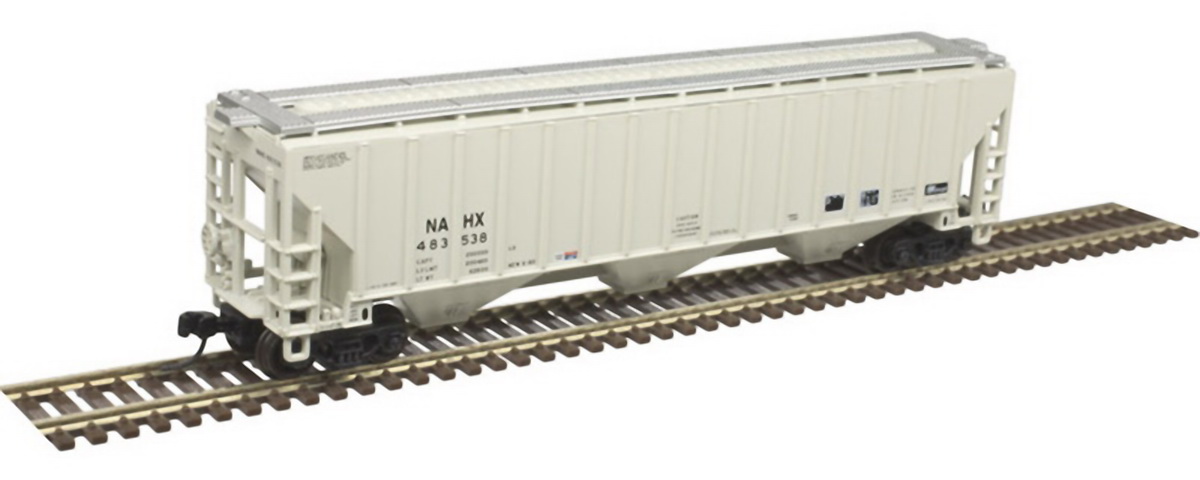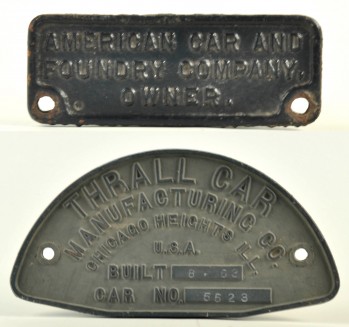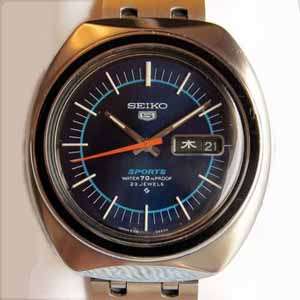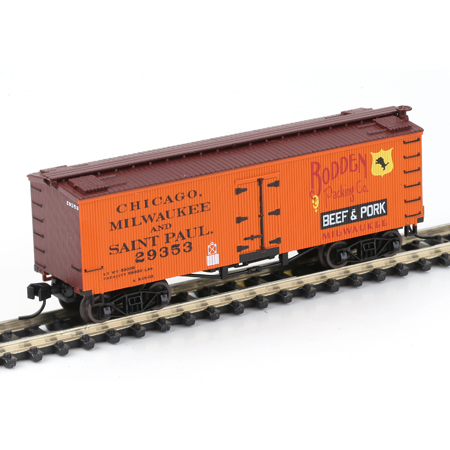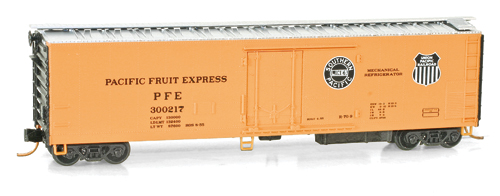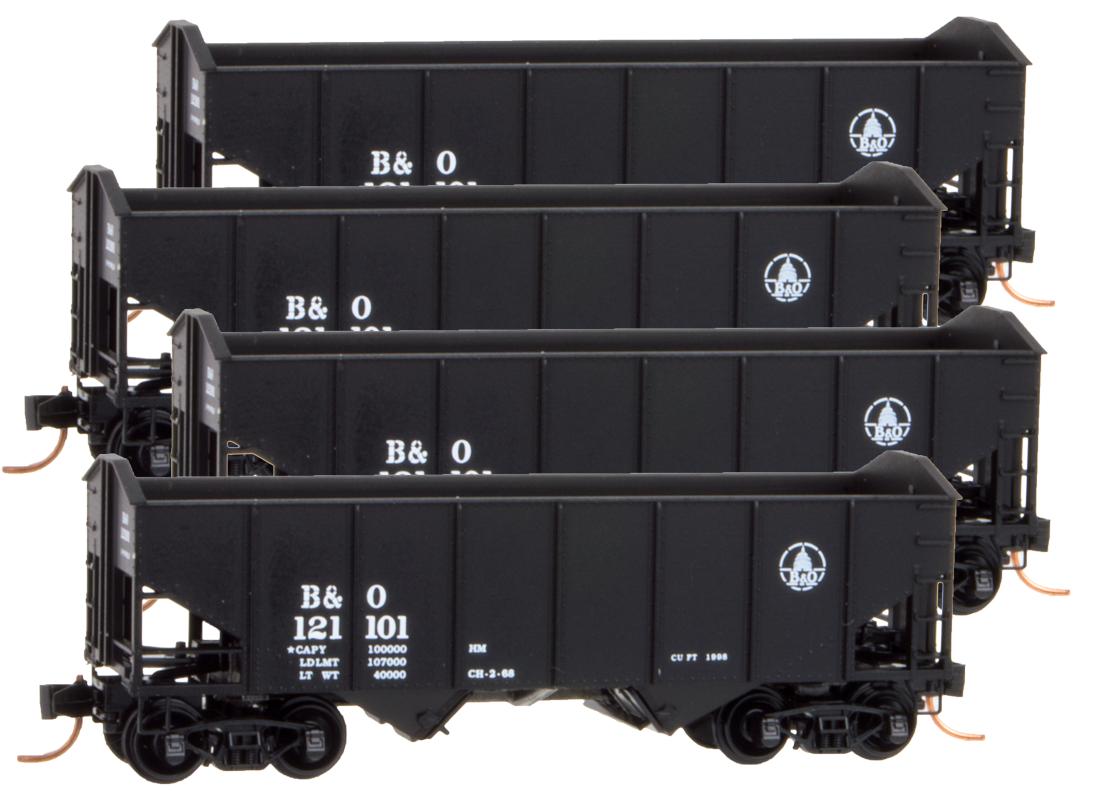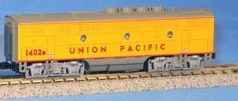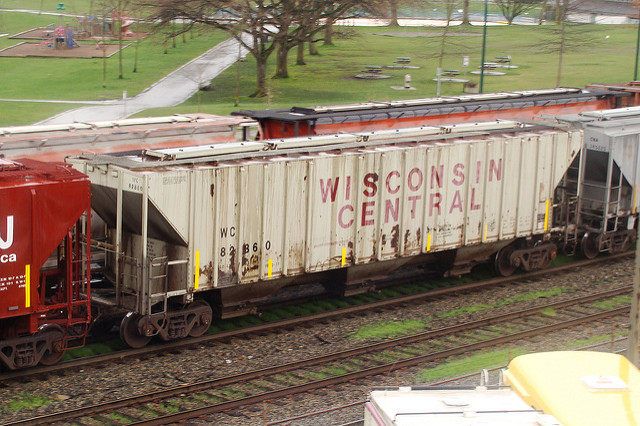Model Information: Atlas introduced this model in 2007. This covered hopper model is based on a late 1970s 263,000 lbs GRL (Gross Rail Loading) 4750 cubic-foot capacity designed by Thrall Car primarily for grain transport. It features a weighted body, AccuMate Knuckle Couplers, and
accurate painting and lettering.
Prototype History: Starting around 1970 or so, every major railcar manufacturer produced a 4750 cubic foot covered hopper. Thrall was no exception. To be honest, these hoppers all look pretty similar. To make matters worse, these cars were modified as improvements were made to the design. In the case of the Thrall model, at least two major revisions were made to this car during the period in which it was produced. The cars were built starting in the late 1970s, this 263,000 lbs GRL (Gross Rail Loading) car is used primarily for grain transport. The thrall models feature 3 bays and rib sides. The roof is flat. These cars were used by the Burlington Northern in large numbers as well as by many other railroads.
Road Name History: 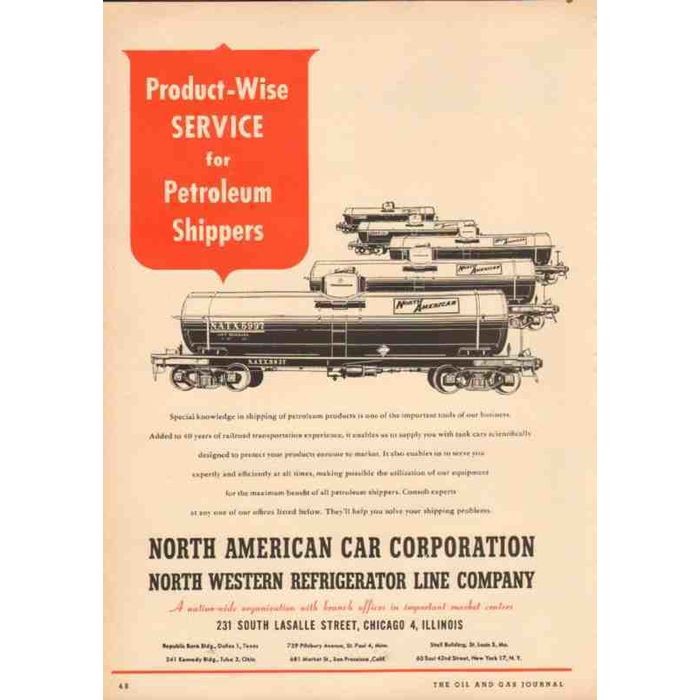 The successful North American Car Company of Chicago, was incorporated in 1907. It grew and expanded, proving that the railcar leasing business could be quite profitable if well managed. North American was active in all the normal specialties of shipper lines, even including poultry. The company later became involved with the production of their own cars. They designed, produced and marketed tank cars, hoppers and boxcars. North American Car Corp. was based in Chicago, Illinois at 222 South Riverside Plaza.
The successful North American Car Company of Chicago, was incorporated in 1907. It grew and expanded, proving that the railcar leasing business could be quite profitable if well managed. North American was active in all the normal specialties of shipper lines, even including poultry. The company later became involved with the production of their own cars. They designed, produced and marketed tank cars, hoppers and boxcars. North American Car Corp. was based in Chicago, Illinois at 222 South Riverside Plaza.
In 1986 GE Railcar Services Corp. acquired the assets of North American Car Corp. GE acquired ~35000 railcars and 14 maintenance units in North America at a cost of $420 million. North American Car, a unit of Tiger International Inc., filed for Chapter 11 bankruptcy reorganization in Los Angeles in December, 1984. NACC had been Tiger International's only profitable unit.

In 1986 GE Railcar Services Corp. acquired the assets of North American Car Corp. GE acquired ~35000 railcars and 14 maintenance units in North America at a cost of $420 million. North American Car, a unit of Tiger International Inc., filed for Chapter 11 bankruptcy reorganization in Los Angeles in December, 1984. NACC had been Tiger International's only profitable unit.
Brand/Importer Information: In 1924 Stephan Schaffan, Sr. founded the Atlas Tool Company in Newark, New Jersey. In 1933 his son, Stephan Schaffan, Jr., came to work for his father at the age of sixteen. Steve Jr. built model airplanes as a hobby and frequented a local hobby shop. Being an enterprising young man, he would often ask the owner if there was anything he could do to earn some extra spending money. Tired of listening to his requests, the hobby-store owner threw some model railroad track parts his way and said, "Here, see if you can improve on this".
In those days, railroad modelers had to assemble and build everything from scratch. Steve Jr. created a "switch kit" which sold so well, that the entire family worked on them in the basement at night, while doing business as usual in the machine shop during the day.
Subsequently, Steve Jr. engineered the stapling of rail to fiber track, along with inventing the first practical rail joiner and pre-assembled turnouts and flexible track. All of these products, and more, helped to popularize model railroading and assisted in the creation of a mass-market hobby. The budding entrepreneur quickly outgrew the limitations of a basement and small garage operation. Realizing they could actually make a living selling track and related products, Steve and his father had the first factory built in Hillside, New Jersey at 413 Florence Avenue in 1947. On September 30, 1949, the Atlas Tool Company was officially incorporated as a New Jersey company.
In 1985, Steve was honored posthumously for his inventions by the Model Railroad Industry Association and was inducted into the Model Railroad Industry Hall of Fame in Baltimore, Maryland. In addition, Steve was nominated and entered into the National Model Railroad Association Pioneers of Model Railroading in 1995.
In the early 1990s, the Atlas Tool Company changed its name to Atlas Model Railroad Company, Inc.
In those days, railroad modelers had to assemble and build everything from scratch. Steve Jr. created a "switch kit" which sold so well, that the entire family worked on them in the basement at night, while doing business as usual in the machine shop during the day.
Subsequently, Steve Jr. engineered the stapling of rail to fiber track, along with inventing the first practical rail joiner and pre-assembled turnouts and flexible track. All of these products, and more, helped to popularize model railroading and assisted in the creation of a mass-market hobby. The budding entrepreneur quickly outgrew the limitations of a basement and small garage operation. Realizing they could actually make a living selling track and related products, Steve and his father had the first factory built in Hillside, New Jersey at 413 Florence Avenue in 1947. On September 30, 1949, the Atlas Tool Company was officially incorporated as a New Jersey company.
In 1985, Steve was honored posthumously for his inventions by the Model Railroad Industry Association and was inducted into the Model Railroad Industry Hall of Fame in Baltimore, Maryland. In addition, Steve was nominated and entered into the National Model Railroad Association Pioneers of Model Railroading in 1995.
In the early 1990s, the Atlas Tool Company changed its name to Atlas Model Railroad Company, Inc.
Item created by: CNW400 on 2018-11-12 11:47:23. Last edited by CMK on 2020-05-11 13:57:59
If you see errors or missing data in this entry, please feel free to log in and edit it. Anyone with a Gmail account can log in instantly.
If you see errors or missing data in this entry, please feel free to log in and edit it. Anyone with a Gmail account can log in instantly.


